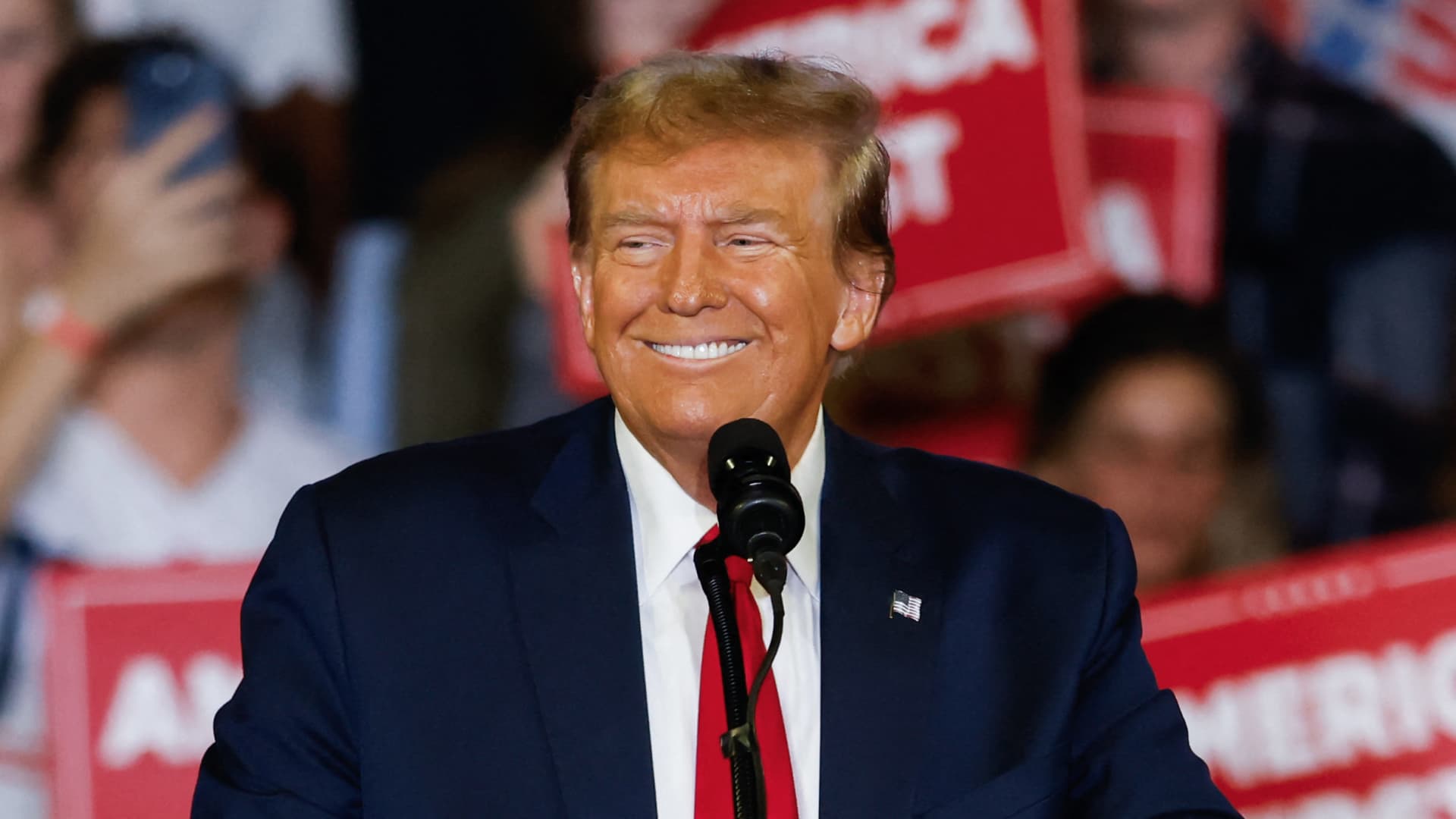Former US President and 2024 presidential hopeful Donald Trump speaks at a “Get Out the Vote” Rally in Conway, South Carolina, on February 10, 2024.
Julia Nikhinson | Afp | Getty Images
The Supreme Court on Monday unanimously reversed the Colorado court ruling that barred Donald Trump from appearing on the state’s Republican presidential primary ballot because of a provision in the U.S. Constitution related to people who engage in insurrection.
The Supreme Court’s ruling means that no other state can bar Trump, or any other candidate, from a presidential ballot by invoking the insurrection clause in the Constitution’s 14th Amendment.
The decision Monday said that “States have no power under the Constitution to” enforce the provision disqualifying people from federal office if they engaged in insurrection, “especially the Presidency.” The ruling did say that states could disqualify people from holding state offices on those grounds.
“For the reasons given, responsibility for enforcing Section 3 against federal officeholders and candidates rests with Congress and not the States,” the ruling said. “The judgment of the Colorado Supreme Court therefore cannot stand.”
Trump in a Truth Social post reacting to the ruling wrote, “BIG WIN FOR AMERICA!!!”
The decision, which means votes he garners on Tuesday’s ballot will count for the former president, was not a surprise.
During oral arguments in the case on Feb. 8, many of the court’s nine justices appeared skeptical of the Colorado Supreme Court’s rationale and process for disqualifying Trump from the ballot.
“I think that the question that you have to confront is why a single state should decide who gets to be president of the United States,” Justice Elena Kagan, one of the court’s more progressive members, said during the hearing to a lawyer for the six Colorado voters who sought Trump’s disqualification.
After Colorado barred Trump from the ballot, two other states, Maine and Illinois, did the same.
But those decisions were on hold pending appeals by Trump, the frontrunner for the Republican presidential nomination.
Jena Griswold, Colorado secretary of state, center, speaks with members of the media outside the US Supreme Court in Washington, DC, US, on Thursday, Feb. 8, 2024.
Nathan Howard | Bloomberg | Getty Images
All three states’ decisions to block Trump from their ballots were based on an interpretation of Section 3 of the Constitution’s 14th Amendment, and now are voided because of the Supreme Court’s ruling Monday.
The amendment “was designed to help ensure an enduring Union by preventing former Confederates from returning to power in the aftermath of the Civil War,” the Supreme Court noted Monday.
That section says that “no person” can serve as an officer of the United States who, having previously taken an oath of federal office, “engaged in insurrection or rebellion” against the U.S.
In a ruling in November, a Denver District Court judge ruled that Trump could appear on Colorado’s ballot, despite her belief that he had “engaged in insurrection” by inciting the Jan. 6, 2021, riot at the U.S. Capitol.
The deadly attack on the Capitol was carried out by Trump supporters in order to disrupt the certification of Joe Biden’s Electoral College victory over the incumbent president. It managed only to delay the process by several hours.
A Senate report later found that at least seven people died in connection with the attack, and more than 170 police officers were injured.
For weeks before the riot, Trump falsely claimed that Biden’s victory was the result of widespread ballot fraud. He also engaged in a pressure campaign on his vice president, Mike Pence, state election officials and others to undo Biden’s victory.
After the Denver judge’s ruling in November, the Colorado Supreme Court overturned it in a 4-to-3 ruling that blocked Trump from the primary ballot.
The Colorado high court said there was significant evidence that Trump had engaged in an insurrection.
“We do not reach these conclusions lightly,” the state Supreme Court said in its majority opinion in December.
We are mindful of the magnitude and weight of the questions now before us. We are likewise mindful of our solemn duty to apply the law, without fear or favor, and without being swayed by public reaction to the decisions that the law mandates we reach.”
That court immediately paused the effect of that ruling to give Trump time to appeal the decision to the U.S. Supreme Court, which he did soon after.
This is developing news. Check back for updates.

